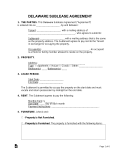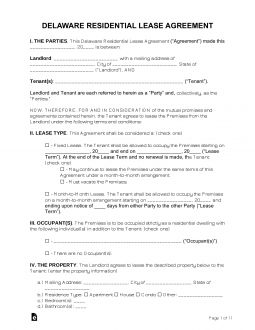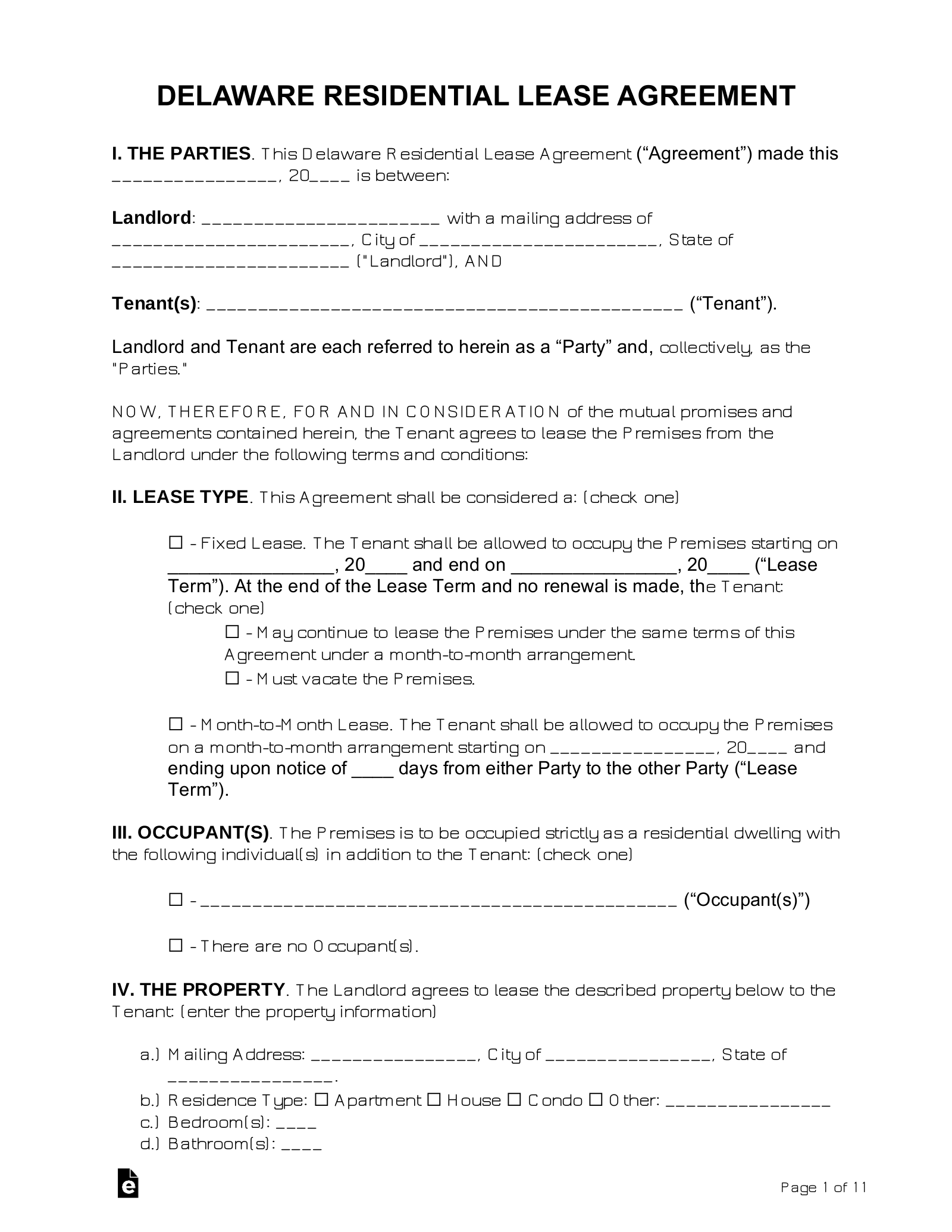Updated April 18, 2024
A Delaware lease agreement is a contract used by landlords when allowing a tenant to occupy and use property in exchange for monthly rent. In addition to rent, the tenant will be required to maintain the property and inform the landlord of any needed repairs. Responsibilities related to utilities and services to the property will be outlined and negotiated in the lease agreement.
Table of Contents |
Agreement Types (6)
 Standard Residential Agreement – Standard fixed version for a term usually amounting to 12 months. Standard Residential Agreement – Standard fixed version for a term usually amounting to 12 months.
Download: PDF, MS Word, OpenDocument |
 Commercial Lease Agreement – For the sole use of renting property to be used by a business. May be for any type of commercial property including office, industrial, and retail. Commercial Lease Agreement – For the sole use of renting property to be used by a business. May be for any type of commercial property including office, industrial, and retail.
Download: PDF, MS Word, OpenDocument |
 Month-to-Month Rental Agreement – Known as a tenancy at will with no end date. The landlord or tenant has the option to cancel at any time. Month-to-Month Rental Agreement – Known as a tenancy at will with no end date. The landlord or tenant has the option to cancel at any time.
Download: PDF, MS Word, OpenDocument |
 Rent-to-Own Lease Agreement – Simple lease with the added benefit of having the option to buy the property during the term. Rent-to-Own Lease Agreement – Simple lease with the added benefit of having the option to buy the property during the term.
Download: PDF, MS Word, OpenDocument |
 Roommate Rental Agreement – For the use of more than one individual seeking a shared living arrangement. Roommate Rental Agreement – For the use of more than one individual seeking a shared living arrangement.
Download: PDF, MS Word, OpenDocument |
 Sublease Agreement – A tenant enters an agreement with a sub-tenant to take over the premises until a specific date or when the master lease expires. Sublease Agreement – A tenant enters an agreement with a sub-tenant to take over the premises until a specific date or when the master lease expires.
Download: PDF, MS Word, OpenDocument |
Required Disclosures (4)
- Landlord-Tenant Code – Landlords must give new tenants a copy of the “Summary of the Delaware Residential Landlord-Tenant Code” offered by the Consumer Protection Unit of the Delaware Attorney General.[1]
- Lead-Based Paint Disclosure – For any residential dwelling constructed prior to 1978.
- Owner/Agent Disclosure – The landlord must include the details of the property owners in the lease.[2]
- Right to Legal Representation – A landlord with more than 3 rental units, who has access to legal representation in the event the tenant defaults on the lease, must provide applicable tenants with a disclosure of their right to legal representation. Tenants covered are those whose household income over the preceding 12 months falls below 200% of the federal poverty guidelines. They may be entitled to receive free legal representation from one of Delaware’s designated non-profit organizations. Visit https://delegalhelplink.org/dehousing-1 for more information.[3]
Security Deposits
Maximum Amount – Equal to one month for yearly agreements. For month-to-month leases (also known as a “tenancy at will”), there is no maximum amount until the tenancy has reached a year in duration. This does not apply to furnished units.[4]
Separate Bank Account – Security deposits must be held in an escrow account not to be used for any other purpose.[5]
Returning to Tenant – At the end of the lease, the landlord must return the security deposit within 20 days.[6]
- Itemized List – The landlord must provide an itemized list of damages and costs they intend to deduct from the deposit within the 20 day return period.
When is Rent Due?
Grace Period – No late fees may be applied within a five day grace period of the agreed upon due date for rent. [7] If rent remains in default, the landlord can start eviction proceedings by issuing a 5-day notice to quit.
Maximum Late Fee (5%) – Late fees cannot exceed 5% of the monthly rent amount.[7]
NSF Fee – $50 is the maximum fee for a dishonored check.[8]
Withholding Rent – Tenants may not withhold rent for repairs. If a defect comes to the tenant’s attention, they must notify the landlord in writing.[9]
Right to Enter (Landlord)
Standard Access – The landlord must provide 48 hours’ notice to the tenant before entering the premises, except for repairs requested by the tenant. Access is only permitted between 8:00 a.m. and 9:00 p.m.[10]
Immediate Access – No advance notice is required in the case of an emergency.[10]
Abandonment
Absence – The landlord may require in the lease agreement that the tenant provide notice of any extended absence within the first day of the absence.[11]
Breaking the Lease – If the tenant leaves early, the landlord is entitled to whichever amount is lower of the following: 1) rent due for the remainder of the lease term, or 2) the rent lost, plus expenses, in the time it took to find a replacement tenant.[12]
Tenant’s Utility Shutoff – Tenants must use electrical, plumbing, sanitary, heating, and other facilities and appliances in a reasonable manner.[13] However, the law does not specifically address the tenant’s responsibility to maintain essential utilities.
Unclaimed Property – The landlord may immediately remove and store at the tenant’s expense any property left behind at the end of the lease. After seven days, the property is considered abandoned and may be disposed of.[14]


